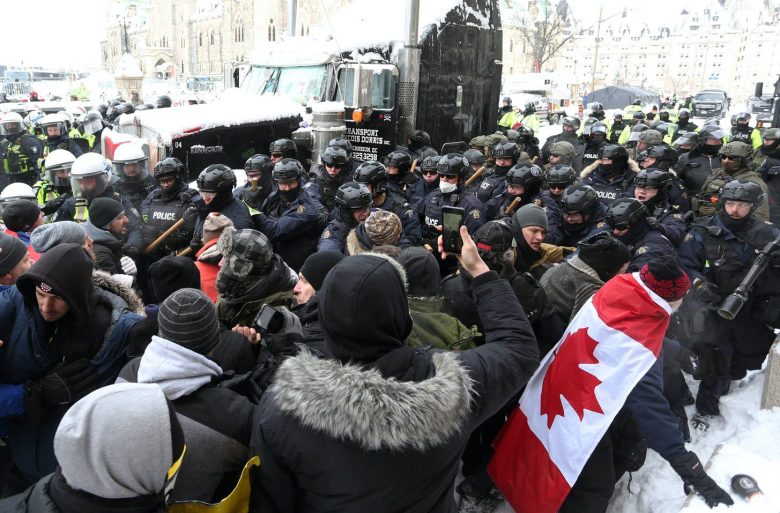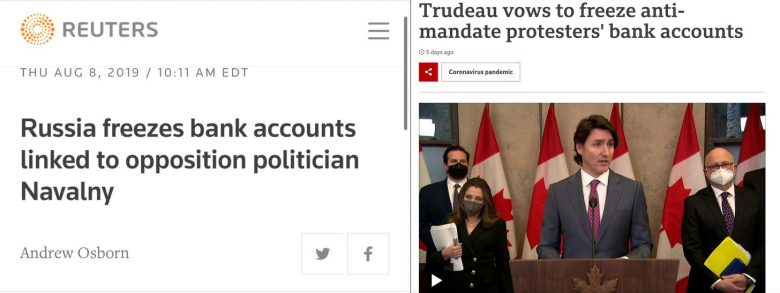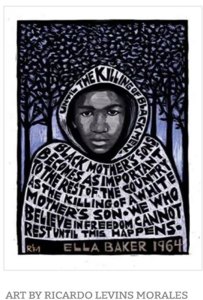Those who most flamboyantly proclaim that they are fighting fascists continue to embrace and wield the defining weapons of despotism.
By Glenn Greenwald Substack ScheerPost February 22, 2022

When it comes to distant and adversarial countries, we are taught to recognize tyranny through the use of telltale tactics of repression. Dissent from orthodoxies is censored. Protests against the state are outlawed. Dissenters are harshly punished with no due process. Long prison terms are doled out for political transgressions rather than crimes of violence. Journalists are treated as criminals and spies. Opposition to the policies of political leaders are recast as crimes against the state.
When a government that is adverse to the West engages in such conduct, it is not just easy but obligatory to malign it as despotic. Thus can one find, on a virtually daily basis, articles in the Western press citing the government’s use of those tactics in Russia, China, Iran, Venezuela and whatever other countries the West has an interest in disparaging (articles about identical tactics from regimes supported by the West — from Riyadh to Cairo — are much rarer). That the use of these repressive tactics render these countries and their populations subject to autocratic regimes is considered undebatable.
But when these weapons are wielded by Western governments, the precise opposite framework is imposed: describing them as despotic is no longer obligatory but virtually prohibited. That tyranny exists only in Western adversaries but never in the West itself is treated as a permanent axiom of international affairs, as if Western democracies are divinely shielded from the temptations of genuine repression. Indeed, to suggest that a Western democracy has descended to the same level of authoritarian repression as the West’s official enemies is to assert a proposition deemed intrinsically absurd or even vaguely treasonous.
The implicit guarantor of this comforting framework is democracy. Western countries, according to this mythology, can never be as repressive as their enemies because Western governments are at least elected democratically. This assurance, superficially appealing though it may be, completely collapses with the slightest critical scrutiny. The premise of the U.S. Constitution and others like it is that majoritarian despotism is dangerous in the extreme; the Bill of Rights consists of little more than limitations imposed on the tyrannical measures majorities might seek to democratically enact (the expression of ideas cannot be criminalized even if majorities want them to be; religious freedom cannot be abolished even if large majorities demand it; life and liberty cannot be deprived without due process even if nine of out ten citizens favor doing so, etc.). More inconveniently still, many of the foreign leaders we are instructed to view as despots are popular or even every bit as democratically elected as our own beloved freedom-safeguarding officials.
As potent as this mythological framework is, reinforced by large media corporations over so many decades, it cannot withstand the increasingly glaring use of precisely these despotic tactics in the West. Watching Justin Trudeau — the sweet, well-mannered, well-raised good-boy prince of one of the West’s nicest countries featuring such a pretty visage (even on the numerous occasions when marred by blackface) — invoke and then harshly impose dubious emergency, civil-liberties-denying powers is just the latest swing of the hammer causing this Western sculpture to crumble. In sum, you are required by Western propaganda to treat the two images below as fundamentally different; indeed, huge numbers of people in the West vehemently denounce the one on the left while enthusiastically applauding the one on the right. Such brittle mythology can be sustained only for so long:

The decade-long repression of Julian Assange and WikiLeaks, standing alone, demonstrates how grave neoliberal attacks on dissent have become. Many are aware of key parts of this repression — particularly the decade-long effective detention of Assange — but have forgotten or, due to media malfeasance, never knew several of the most extreme aspects.
While the Obama DOJ under Attorney General Eric Holder failed to find evidence of criminality after convening a years-long Grand Jury investigation, the then-Chairman of the Senate Homeland Security Committee, Sen. Joseph Lieberman (I-CT), succeeded in pressuring financial services companies such as MasterCard, Visa, PayPal and Bank of America to terminate WikiLeaks’ accounts and thus banish them from the financial system, choking off their ability to receive funds from supporters or pay their bills. Lieberman and his neocon allies also pressured Amazon to remove WikiLeaks from its hosting services, causing the whistleblower group to be temporarily offline. All of that succeeded in crippling WikiLeaks’ ability to operate despite being charged with no crime: indeed, as the DOJ admitted, it could not prove that the group committed any crimes, yet this extra-legal punishment was nonetheless meted out.
Those tactics pioneered against WikiLeaks — excluding dissenters from the financial system and coercing tech companies to deny them internet access without a whiff of due process — have now become standard weapons. Trudeau’s government seizes and freezes bank accounts with no judicial process. The “charity” fundraising site GoFundMe first blocked the millions of dollars raised for the truckers and announced it would redirect those funds to other charities, then refunded the donations when people pointed out, rightly, that their original plan amounted to a form of stealing. When an alternative fundraising site, GiveSendGo, raised millions more for the truckers, Canadian courts blocked its distribution. And it was just over a year ago when Democratic politicians such as Rep. Alexandra Ocasio-Cortez (D-NY) successfully pressured tech monopolies Google and Apple to remove Parler from its stores and then pressured Amazon to remove the social media site from its servers, at exactly the time the social media alternative became the single most-downloaded app in America. (This morning we published a new video report on Rumble that traces the emergence of this new anti-dissent tactic first pioneered on WikiLeaks and now widely used against dissent generally: “Banishment from the Financial System: the War on Dissent”).
That the U.S. and UK Governments have kept Assange himself — one of the most effective dissidents in the West in decades — in a cage for years with no end in sight by itself highlights how repressive they are. But the precipitating cause of Assange’s apprehension from the Ecuadorian Embassy has been forgotten by many and it, too, illustrates the same disturbing trend.
In 2017, mass protests erupted in Barcelona as part of a movement in Catalonia for more autonomy from the Madrid-based Spanish government, culminating in a referendum for autonomy on October 1. In 2019, even larger and more intense protests materialized. The methods used to crush the protests shocked many, as such domestic aggression had been rarely seen for years in western Europe. Spain treated the activists not as domestic protesters exercising their civic rights but as terrorists, seditionists and insurrectionists. Violence was used to sweep up Catalans in mass arrests, and their leaders were charged with terrorism and sedition and given lengthy prison sentences.
About the crackdown, a protest video proclaimed that Spain had just witnessed “a degree of force never seen before in a European member state.” While a fact-check by the BBC failed to affirm that maximalist claim, it documented multiple grave attacks by the police on protesters in Catalonia. Meanwhile, “Spanish police engaged in excessive force when confronting demonstrators in Catalonia during a disputed referendum, using batons to hit non-threatening protesters and causing multiple injuries,” Human Rights Watched concluded, adding that though the protesters were “largely peaceful,” some “hundreds were left injured, some seriously. Catalonia’s Health Department estimated on October 2 that 893 people had reported injuries to the authorities.”
From the Ecuadorian Embassy, Assange, in both 2017 and then again in 2019, used WikiLeaks’ platforms to vocally publicize and denounce the actions of the Spanish government — not to express support for Catalonian independence but to denounce the civil liberties assaults used to crush the protest movement. Assange made multiple media appearances to object to the use of violence by the state police, and WikiLeaks’ Twitter account, virtually on a daily basis, was publicizing videos and other testimonial evidence of the crackdown.
It was Assange’s reporting on and denouncing of violence by the Spanish government against its own citizens that was the final cause of Ecuador’s decision to rescind its asylum. The Spanish government made clear to Ecuador how indignant they were that Assange was publicizing their abuses. It was just several months after the first protest movement that Ecuador announced it was cutting off Assange’s internet access, claiming the WikiLeaks founder had been “interfer[ing] with other states” — meaning speaking out on the civil liberties abuses by Madrid. And it was the following year that Ecuador, pressured by the U.S., UK and Spain, withdrew its asylum protection and allowed the London police to enter its embassy, arrest Assange, and then put him in the high-security Belmarsh prison where he has remained ever since despite being convicted of no crime other than a misdemeanor count of bail-jumping. All of this reflects, and stems from, a clear and growing Western intolerance for dissent.
This last decade of history is crucial to understand the dissent-eliminating framework that has been constructed and implemented in the West. This framework has culminated, thus far, with the stunning multi-pronged attacks on Canadian truckers by the Trudeau government. But it has been a long time in the making, and it is inevitable that it will find still-more extreme expressions.
It is, after all, based in the central recognition that there is mass, widespread anger and even hatred toward the neoliberal ruling class throughout the West. Trump, Brexit and the rise of far-right parties in places where their empowerment was previously unthinkable — including Germany and France — is unmistakable proof of that. Rather than sacrifice some of the benefits of inequality that have generated much of that rage or placate or appease it with symbolic concessions, Western neoliberal elites have instead opted for force, a system that crushes all forms of dissent as soon as they emerge in anything resembling an effective, meaningful or potent form.
What is most notable, though, is that this alleged criminality is not adjudicated through judicial proceedings — with all the accompanying protections of judges, juries, rules of evidence and requirements of due process — but simply by decree.
So many of the controversies over the last decade, often analyzed in isolation, have been devoted to this goal. The pervasive surveillance systems constructed by the West — revealed during the Snowden reporting but only partially reined in at best since then — are crucial tools, as surveillance powers always are, for monitoring and thus stifling dissent. We have now arrived at the point where the U.S. Government and its security state is officially and explicitly clear that it regards the greatest national security threat not as a foreign power such as China or Russia, and not as non-state actors such as Al Qaeda or ISIS, but rather “domestic extremists.” For years, this has been the unyielding message of the DHS, FBI, CIA, NSA and DOJ: our primary enemies are not foreign but are our fellow citizens who have embraced ideologies we regard as extremist.
This new escalation of repression depends upon a narrative framework. Those who harbor dissenting ideologies — and particularly those who do not embrace that dissent passively but instead take action to advocate, promote and spread it — are not merely dissenters. The term “dissent,” in Western democracies, connotes legitimacy, so that label must be denied them. They are instead domestic extremists, domestic terrorists, seditionists, traitors, insurrections. Applying terms of criminality renders justifiable any subsequent acts of repression: we are trained to accept that core liberties are forfeited upon the commission of crimes.
What is most notable, though, is that this alleged criminality is not adjudicated through judicial proceedings — with all the accompanying protections of judges, juries, rules of evidence and requirements of due process — but simply by decree.
When financial services companies “choked” WikiLeaks back in 2010, they justified it by pointing to the government’s claim that the group was engaged in crimes and therefore in violation of the rules of the platforms (“‘MasterCard rules prohibit customers from directly or indirectly engaging in or facilitating any action that is illegal,’ spokesman Chris Monteiro said” when explaining its shutting of WikiLeaks’ account). The same was done to 1/6 protesters who have been punished in countless ways prior to conviction. And now Canadian truckers have been magically transformed into criminals without the inconvenience of a trial; “‘we now have evidence from law enforcement that the previously peaceful demonstration has become an occupation, with police reports of violence and other unlawful activity,’ GoFundMe said” when explaining why it shut down fundraising accounts.
Last June, PayPal announced a new partnership with the Anti-Defamation League (ADL), whereby the liberal activist group would identify individuals and groups whose ideology is, in the eyes of the ADL, “extremist.” This would enable not only PayPal but financial services companies around the world to then terminate their accounts and exclude them from the financial system. Clearly, once the ADL declares a person or group to be “extremist” and PayPal banishes them, no other mainstream corporation will want to be accused of hosting them. As PayPal’s founding Chief Operating Officer David Sacks warned at the time the partnership was announced, the purpose of this program is “shutting down people and organizations that express views that are entirely lawful, even if they are unpopular in Silicon Valley.” Comparing this to the spate of unified Silicon Valley censorship that has erupted over the last several years, Sacks explained why this power is so alarming:
As for the notion of building your own PayPal or Facebook: because of their gigantic network effects and economies of scale, there is no viable alternative when the whole industry works together to deny you access.
Kicking people off social media deprives them of the right to speak in our increasingly online world. Locking them out of the financial economy is worse: It deprives them of the right to make a living. We have seen how cancel culture can obliterate one’s ability to earn an income, but now the cancelled may find themselves without a way to pay for goods and services. Previously, cancelled employees who would never again have the opportunity to work for a Fortune 500 company at least had the option to go into business for themselves. But if they cannot purchase equipment, pay employees, or receive payment from clients and customers, that door closes on them, too.
This is why it is so imperative for the Democratic Party and their media allies to describe the four-hour riot at the Capitol on January 6 as an insurrection and attempted coup. If those are mere protesters or even just rioters, then all the standard protections and legal safeguards apply to them, as liberals demanded be applied to protect BLM and Antifa protesters, even ones who used violence.
A new structure of speech-policing groups has been created — funded by the same small handful of neoliberal billionaires and administered by groups such as the Atlantic Council that invariably have ties to Western intelligence agencies…
If, however, they are part of a broader insurrectionary movement — an ongoing attempt to overthrow the U.S. Government — then they are elevated from ordinary political adversaries into a faction of sustained criminality, and anything and everything, from censorship and detention to extra-legal means of banishment such as no-fly lists and exclusion from the financial system, becomes justified, even necessary. (Note that such repressive tactics, cheered by liberals and even many on the left, have often swept up anti-establishment voices on the left, such as when PayPal banned Antifa-linked individuals along with Proud Boys members, and when animal rights activists are targeted for persecution by the FBI along with Oath Keepers, but such is the inevitable outcome of censorship and dissent-repressive schemes).
The examples of emerging repression of dissident ideologies are far too numerous to list. They have been reported here and elsewhere at length. Those with views that diverge from neoliberal orthodoxy on everything from the origins of COVID, the efficacy of cloth masks, Pfizer’s claims about multiple vaccine doses, rapidly evolving pieties of gender identity, the integrity of the 2016 and 2020 elections, the efficacy and justifiability of state-ordered lockdowns and vaccine mandates, and a slew of other contentious debates have been systematically purged from the internet.
A new structure of speech-policing groups has been created — funded by the same small handful of neoliberal billionaires and administered by groups such as the Atlantic Council that invariably have ties to Western intelligence agencies — with the sole intention of concocting new terms and theories (disinformation, misinformation, foreign influence) to justify mass online censorship.
Much of this censorship occurs through a combination of state and corporate power (a defining prong of the academic definition of fascism) while other times it is even worse: the by-product of demands for censorship accompanied by explicit threats for non-compliance from the majority party in Washington. Thus has the internet, in a very short time, degraded from its original promise (an unprecedented tool of liberation to free people from centralized state and corporate control) into its exact opposite (the most potent tool yet developed to control discourse and surveil populations).
Leading Democrats spent last year advocating for the return of the no-fly list: this time for American citizens whom the government alleges but never proved were associated with the January 6 riot. Such individuals have been consigned to months of pre-trial solitary confinement, subjected to years of prison without any claim that they resorted to violence, even consigned to longer prison terms than those sought by prosecutors. Both judges and prosecutors in these cases have hardly been shy about acknowledging the political nature of this punishment: the necessity to send a message to others who would engage in similar protests that they will suffer greatly if they do so. And the Congressional 1/6 Committee has been little more than an exercise in investigating citizens for exercising their constitutional rights to organize protests.
Few things are more dangerous than a political leader who convinces themselves that they are so benevolent and well-intentioned that anything they do is inherently justified in light of their noble character and their enlightened ends. One of the few things more alarming is a political movement that truly comes to believe that they are engaged in a battle not against political adversaries but in an existential and world-historic war against seditionists, traitors, insurrectionists and terrorists.
Once a person or movement becomes convinced that their opponents have exited the ordinary playing field of politics, then they are instantly convinced of the righteousness of any and all tactics used to attack them. Within the logical world where one is convinced that they really are fighting a white nationalist, fascistic, insurrectionary global movement to overthrow liberal democracy, then all the weapons we were long taught to view as despotic suddenly become ennobled, even tools necessary for the protection and advancement of democracy. And it is through this self-glorifying tale which Western neoliberals are telling themselves that they have become exactly what they shrilly insist they are battling.



[…] 02/22/22 Rise Up Times: GLENN GREENWALD: THE NEOLIBERAL WAR ON DISSENT IN THE WEST https://riseuptimes.org/2022/02/23/glenn-greenwald-the-neoliberal-war-on-dissent-in-the-west/ […]